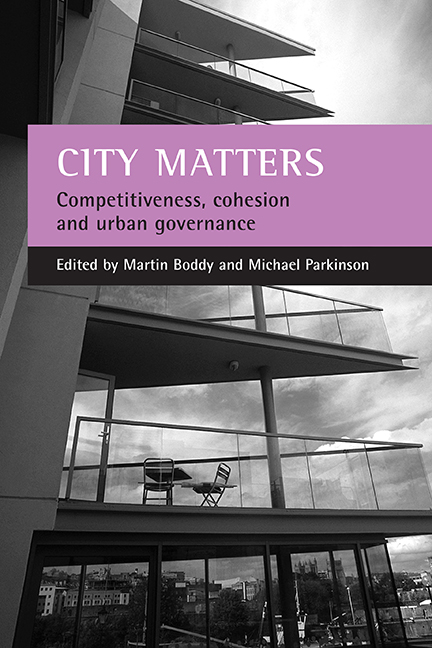Book contents
- Frontmatter
- Contents
- List of tables and figures
- Foreword
- Acknowledgements
- Notes on contributors
- one Introduction
- Part One Competitiveness, cohesion and urban governance
- Part Two Competitiveness and urban change
- Part Three Competitiveness, innovation and the knowledge economy
- Part Four Housing, property and economic performance
- Part Five Space, place and social cohesion
- Part Six Ethnicity, enterprise and social cohesion
- Part Seven Leadership, governance and social capital
- Conclusions
- Index
seventeen - Ethnic minority enterprise in an inner-city context: the case of the independent restaurant sector in Birmingham
Published online by Cambridge University Press: 20 January 2022
- Frontmatter
- Contents
- List of tables and figures
- Foreword
- Acknowledgements
- Notes on contributors
- one Introduction
- Part One Competitiveness, cohesion and urban governance
- Part Two Competitiveness and urban change
- Part Three Competitiveness, innovation and the knowledge economy
- Part Four Housing, property and economic performance
- Part Five Space, place and social cohesion
- Part Six Ethnicity, enterprise and social cohesion
- Part Seven Leadership, governance and social capital
- Conclusions
- Index
Summary
Introduction
Government, government agencies and economic development bodies have frequently seen the role of small businesses, enterprise and self-employment as a key element of competitive strength both nationally and at local and regional scales. Enterprise and self-employment has been seen as particularly relevant in addressing the particular barriers to work and economic well-being faced by ethnic minorities (Cabinet Office Strategy Unit, 2003). This has more general relevance to the competitive strength of core urban areas, given the scale and concentration of people from ethnic minorities in such areas.
While entrepreneurial self-employment is already a conspicuous feature of the economic position of Britain’s ethnic minorities, this is heavily concentrated within marginal business sectors such as corner shop retailing, catering and clothing manufacture, all of which are subject to intense competition. Of these activities, catering enjoys by far the most promising market potential, based as it is on the appeal of a specialised ethnic product to a wider market. Indeed, the ‘ethnic’ restaurant industry is currently one of Britain’s fastest growing service sectors (Mintel, 1999) although, somewhat perversely as we shall see, this does not guarantee rich pickings for all its participants. This raises particular issues in relation to cohesion and exclusion alongside issues of competitiveness.
In this chapter, we focus on ethnic restaurants in Birmingham, a city renowned for an intense inner-city cluster of South Asian curry houses with its own distinctive brand name – the ‘Balti Quarter’. This striking spatial agglomeration both expresses and influences the struggles for entrepreneurial survival, which characterise the South Asian restaurant sector. On the one hand, restaurateurs profit in this instance from membership of a high-profile cluster, whose name is widely familiar throughout and beyond the city, a veritable magnet for a growing mass of middle-class ‘omniverous diners’ seeking the authentic ethnic culinary experience (Warde et al, 1999). At the same time, the perceived benefits of this location have attracted a surfeit of restaurateurs, with supply outlets outrunning even a rapid expansion of demand, leading to serious overcompetition and unviable returns for many of these businesses (Ram et al, 2002). Of interest here also are the implications that spatially concentrated business activity has for urban policy makers.
- Type
- Chapter
- Information
- City MattersCompetitiveness, Cohesion and Urban Governance, pp. 307 - 322Publisher: Bristol University PressPrint publication year: 2004



